Normally, in low and slow BBQ, dry protein is not the desired outcome – unless you’re making Jerky!
I’m going to show you how a couple of different methods to create flavorsome, delicious smoked beef jerky that’s not overly chewy or tough.
I’ll also talk you through choosing your protein, the correct way to slice to ensure your jerky isn’t tough, and a perfect marinade that’s just the right combo for classic beef jerky. You can also check out the video version of this recipe below.
Once you’ve made it, you’ll be getting requests from everyone (and you’ll never want to eat Jack Links jerky again).
[TAG0]
Beef Jerky 101
Drying and/or curing meat is an age-old method of preserving meat, going back centuries.
Jerky comes from a South American tribe called Quechua, originally part of the ancient Inca empire.
The word derives from the word “ch’arki”, which means ‘to burn.’ Fortunately, we won’t be burning any meat today, but we will use similar techniques to dry the meat.
The smoker is the best way to make beef jerky, but I’ll also give you a modern twist that helps make the process a little easier.
This jerky makes for a great snack but can also be used for an awesome DIY gift.
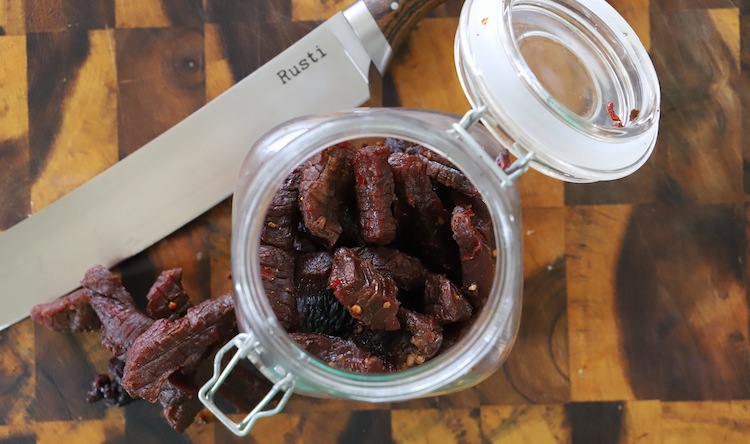
Enjoy the beef jerky as a delicious snack, and keep the rest in a sealed container
What kind of meat do you use to make jerky?
Traditionally, Jerky is made from beef, but I’ve experimented with all kinds of meat, including more exotic varieties like elk jerky, venison jerky, and good old Aussie kangaroo jerky!
I’ve had success with all kinds of meats and some that have been a bit hit and miss (crocodile jerky, anyone??), but feel free to experiment and let us know what wins you’ve had in the comments section below.
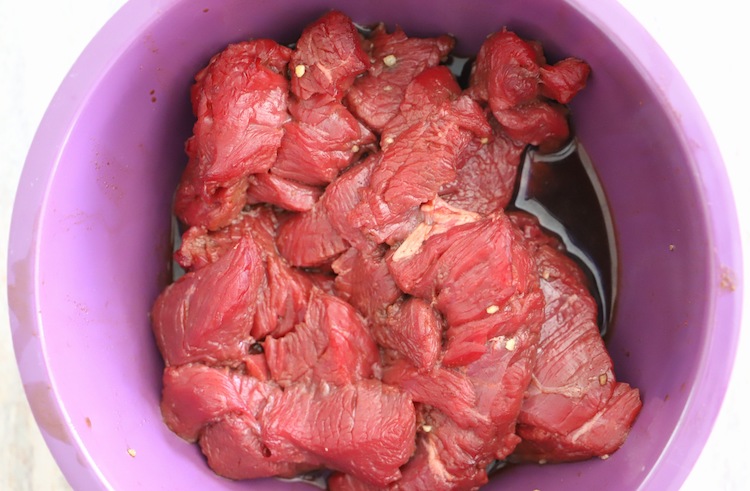
Choose a lean cut of beef for a traditional jerky recipe
The main thing to remember is that your cut of meat needs to be very lean – this is why kangaroo and venison are great different cuts to use to make jerky.
If you are making beef jerky, I recommend using an economical topside (or Round cut).
You could use filet, but you could also have your butler’s hand feed you caviar if you’re spending that kind of money on meat for jerky.
So why is choosing a lean cut better, and not, say, a Wagyu MB9 brisket or New York Strip?
Fat = flavor, right? That’s what I’ve always been told.
Fat simply doesn’t dry out properly, meaning your finished product can turn rancid pretty quickly. Also, you don’t want your jerky to have oily, chewy bits of fat running through it.
The best temperature to smoke beef jerky at
The ideal temperature to smoke beef jerky is between 160-180°F. This allows the beef to dehydrate without being cooked. You can go up to 200°F and you should be OK but much hotter and you run the risk of drying out your jerky.
Smoking your own beef jerky
I’ll run through my full process for smoking my own beef jerky. There’s plenty of debate on if it’s better to smoke or dehydrate jerky.
I like to do both!
I start the process in the smoker to get the extra flavor and then finish my jerky off in a dehydrator. You can do it all in the smoker if you don’t have one, or all in the dehydrator like we did in our teriyaki beef jerky recipe.
What you will need
- A smoker or BBQ capable of low and slow BBQ
- A dehydrator (not essential, but makes it a lot less hands on)
- A large plastic bowl
- Smoking wood – cherry, pecan or oak are all good
- A sharp knife
- Ingredients for marinade
- Selected protein
Making your beef jerky marinade
You’ll want to prepare your marinade the night before you plan on making your beef jerky. Marinating overnight ensures the tastiest possible outcome.
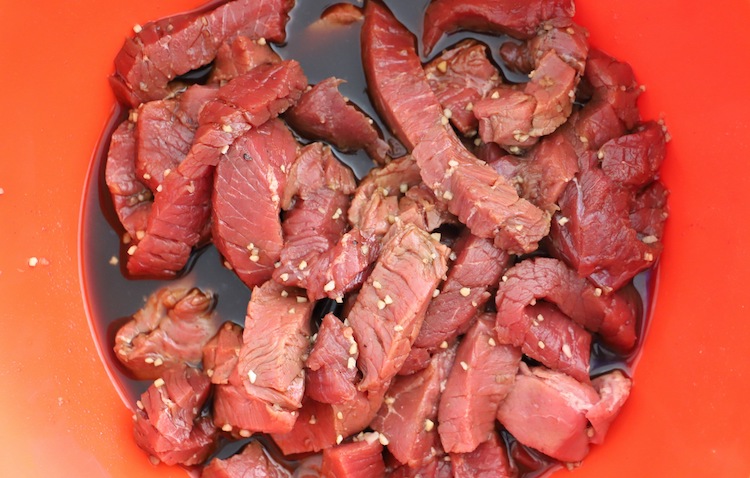
Marinade your protein in a plastic bowl overnight
For beef (or any lean red meat), mix the following into a large plastic bowl – it’s important not to use a metal bowl as the acids in the marinade can react and spoil your meat – the amounts shown are for around 2.5lbs of beef round.
- 1/2 cup soy sauce
- 1/2 cup Worcestershire sauce
- 1/2 cup brown sugar
- 1/2 tbsp paprika
- 1 tsp ginger powder
- 1 tsp salt
- 1 tsp black pepper
Preparing your beef
Now, really importantly, you’ll want to slice your protein against the grain. This will ensure that your final jerky has a nice bite through, without being super tough.
That’s the thing with jerky; when you do it properly, it should actually be a bit soft and with some give when you bite through it.
You don’t want to be tugging it with your teeth like some super chewy toffee. If you slice with the grain, you’ll end up with stringy, tough, and super chewy jerky.
And whilst that will still taste great, it’ll be a big jaw workout for you!
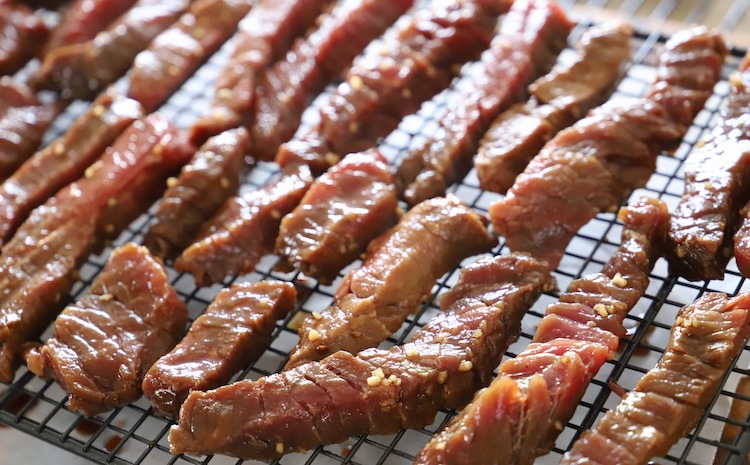
Make sure to slice the jerky against the grain and into 1/3″ wide strips
I like to slice my jerky about 1/3″ wide, and around half that thick. That is to say that the grain should run left to right (or right to left) across the widest part of your slice.
Once you’ve sliced all your protein, mix it all together into the plastic bowl with your prepared marinade and cover with cling wrap, and place in the fridge overnight.
Smoking your beef jerky
You’ll want to prepare your smoker super low for this. You don’t want to cook the meat, the smoking process is really about dehydrating it and remove all the moisture.
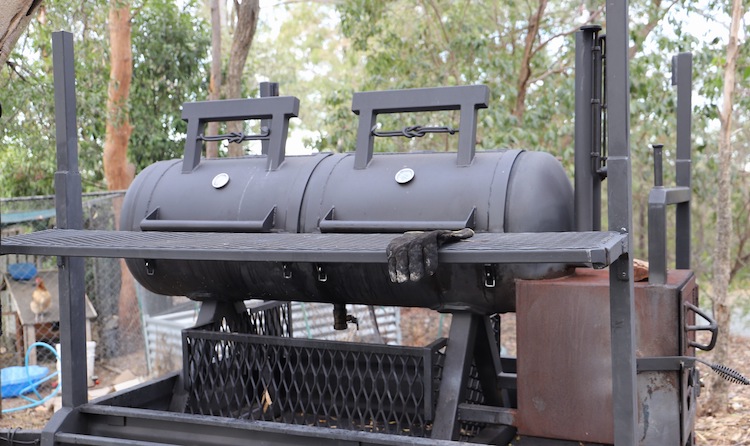
Set your smoker up at a low temperature of about 140-160°F
If you smoke at too high a temp, and you’ll cook and burn the meat. Too low and you won’t be able to effectively remove the moisture. Unless you want to watch your smoker for 3 days. I like to aim for around 140-160°F.
Some smokers can struggle to hit these low temperatures, which is why electric smokers are popular with home jerky makers.
There are a couple of methods that I use to make jerky, both are time heavy, but one of them is fairly hands-off. Either method will result in absolutely incredible jerky.
Seriously, the first time I made jerky years ago, I was amazed at how much better it was than store-bought. And I love store-bought…
Use a smoker and dehydrator
Dehydrators are fairly cheap to buy now, and they aren’t just a one-trick pony.
That is to say that you won’t just use it for jerky – although even if it IS all you use it for, it’s still worth it!
I use my dehydrator for fruit for snacks for my kids, or on the rare occasion I’m trying to lie to myself about eating healthy snacks I’ll do kiwi or banana in the dehydrator for a great energy-rich snack.
However, let’s get back to what we’re here for – delicious jerky!
Set your smoker up at a super low temp – 160°F is what I like to aim for. This low temp can be difficult to control on some smokers, especially offsets, so if you creep up to 200°F or so, that’s ok.
Try to keep it as low as you can – but don’t stress over temp if you’re a bit over, you’re still going to produce better jerky than you can buy in Walmart.
Take your marinated meat out of the fridge, and here’s a tip – use wire cooling racks to lay out your strips of meat. This makes it easier to get into and out of your smoker in quantity and also means you can stack multiple racks on top of each other if you’re doing bulk amounts – which you will want to.
Lay out all your strips of marinated meat on your cooling rack – taking care not to allow pieces to touch – and then smoke using your favorite smoking wood. I have had great results with oak, hickory and pecan, as well as Ironbark, which is an Australian hardwood similar to Oak.
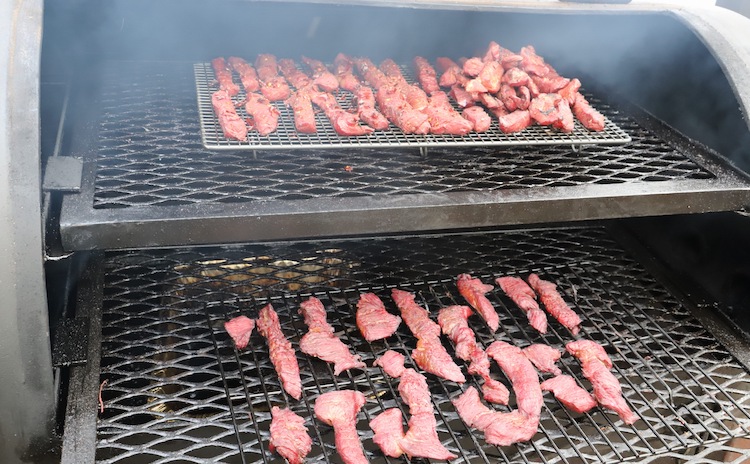
Use wire cooling racks to lay out the jerky in the smoker
I like to give the protein a couple of hours to take on a nice smoke and then for my lazy method, I pull them out of the smoker and load them into the dehydrator at 160°F for around 5-6 hours.
You can leave it in longer if you want to, but I prefer the texture at this time.
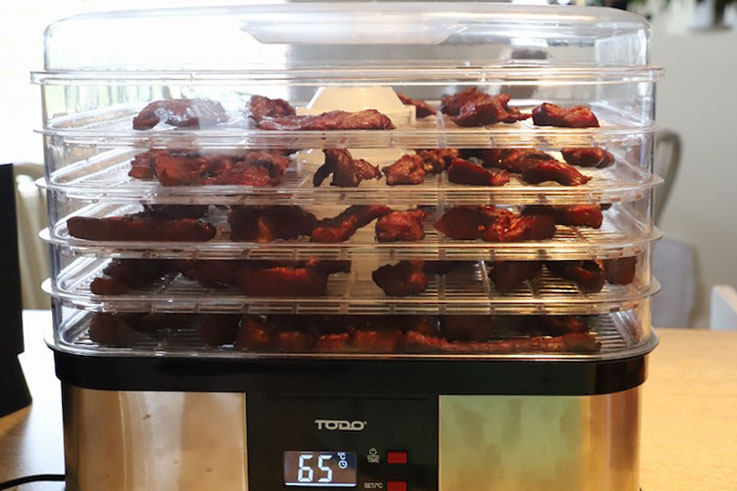
Place the jerky into the dehydrator for about 5-6 hours
If you don’t have a dehydrator then just leave it in your smoker for the total time, but try to use charcoal lump or briquettes for a cleaner burn rather than wood, as I’ve found there is such a thing as TOO smokey. I know, crazy hey?
Once you’re happy, leave to cool and either keep in a sealed container in the fridge or vacseal and keep in a cool place.
Enjoy as a delicious snack with a beer or two watching Football, or if you’re stupid, take to work and spend the next weekend making for all your workmates who now want to place orders for jerky!! I think you can guess which camp I’m in!
Cheers, mate.
Print
Smoked Beef Jerky
Low and slow smoked beef jerky with rich smoky flavor and tender, chewy texture.
Course Snack
Cuisine South American
Prep Time 30 minutes minutes
Cook Time 8 hours hours
Marinate 12 hours hours
Total Time 20 hours hours 30 minutes minutes
Servings 10
Calories 220kcal
Author Mat Cotton
- 2.5 lbs beef round
- ½ cup soy sauce
- ½ cup Worcestershire sauce
- ½ cup brown sugar
- ½ tbsp paprika
- 1 tsp ginger powder
- 1 tsp salt
- 1 tsp black pepper
Slice the meat against the grain into 1/3" strips.
Mix the marinade ingredients together in a large bowl.
Add your meat to he marinade, cover and place in the fridge overnight.
Next day set your smoker to 160°F.
Place the meat on to wire racks and smoke for 2 hours, then remove and place into the dehydrator at 160°F for a further 5-6 hours. If you are not using a dehydrator smoke for 7-8 hours in the smoker.
Cool, then place in a sealed container in the fridge and enjoy!
Calories: 220kcal | Carbohydrates: 14g | Protein: 26g | Fat: 6g | Saturated Fat: 2g | Cholesterol: 70mg | Sodium: 1082mg | Potassium: 542mg | Fiber: 1g | Sugar: 12g | Vitamin A: 27IU | Vitamin C: 2mg | Calcium: 49mg | Iron: 3mg
 Backyard GrillingWeekend WarriorsAdvice from DadBeard GroomingTV Shows for Guys4x4 Off-Road CarsMens FashionSports NewsAncient Archeology World NewsPrivacy PolicyTerms And Conditions
Backyard GrillingWeekend WarriorsAdvice from DadBeard GroomingTV Shows for Guys4x4 Off-Road CarsMens FashionSports NewsAncient Archeology World NewsPrivacy PolicyTerms And Conditions
